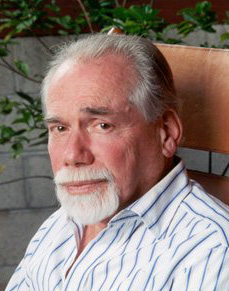
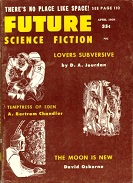 Exploring Tomorrow aired Robert Silverberg’s (1935- ) “The Moon is New” sometime in 1958 (exact dates are unclear or unknown). Exploring Tomorrow ran from December 1957 through December 1958 before being cancelled, though some reliable sources have it running into 1959 thanks to its syndication by the AFRTS (American Forces Radio and Television Service, which aired the series for the troops in the European and Pacific theaters). Unfortunately, many of its 104 bi-weekly (Wednesday & Friday) episodes–some repeats–are lost (including at least seven of Silverberg’s stories), and of those remaining many are of inferior audio quality unless they have been digitally remastered, which is somewhat expensive.
Exploring Tomorrow aired Robert Silverberg’s (1935- ) “The Moon is New” sometime in 1958 (exact dates are unclear or unknown). Exploring Tomorrow ran from December 1957 through December 1958 before being cancelled, though some reliable sources have it running into 1959 thanks to its syndication by the AFRTS (American Forces Radio and Television Service, which aired the series for the troops in the European and Pacific theaters). Unfortunately, many of its 104 bi-weekly (Wednesday & Friday) episodes–some repeats–are lost (including at least seven of Silverberg’s stories), and of those remaining many are of inferior audio quality unless they have been digitally remastered, which is somewhat expensive.
Exploring Tomorrow‘s sketchy history is indicative of many Old Time Radio shows in regards to the authenticity of its air dates. One of the handful of sources I regularly use in conjunction with other OTR sites is Digital Deli Too. I have found it to be the most thoroughly researched and honest OTR site I have run across. Here is what they have to say (in part) about the number of episodes and air dates circulating around Exploring Tomorrow:
“Given our own extensive research, the papers and recollections of Robert Silverberg, and a few clues in the radioGOLDINdex entries, we’re of the belief that there were in all likelihood an estimated 104 broadcasts of Exploring Tomorrow over the course of its MBS [Mutual Broadcasting Sytem, ed.] syndication. As to the long-touted twenty-eight unique exemplars in circulation, we find that allegation equally suspect. We have twenty-two unique exemplars among our own holdings. We would estimate that we’re actually missing only two of the circulating exemplars, for a total of twenty-four in actual circulation. The Pacific Stars and Stripes listings indicate some fifty or so non-repeating episodes among the AFRTS-denatured recordings. There might well be as many as seventy-eight unique scripts within the Exploring Tomorrow canon–or more. It would also appear that a great many of the commercial Exploring Tomorrow broadcasts were repeats.
“Exploring Tomorrrow was an excellent Sci-Fi offering for the era. Sadly, the OTR Community has so utterly butchered and misrepresented the circulating canon that sorting it all out might take years to come–if ever. Some OTR ‘authority’ apparently pronounced the series as running from December 4th 1957 to June 13th 1958–and that, by gum, was that. There’s just one niggling little problem with that pronouncement—it’s a complete and utter lie. In point of fact, Exploring Tomorrow ran well into December of 1958 throughout America–yet another manifestation of the widely held OTR community’s narcissistic misconception that New York was the epicenter of the Golden Age Radio universe.
“Due to the widespread–and widely condoned–butchery of the circulating recordings, it’s most likely that the overwhelming majority of circulating recordings originated from AFRTS-denatured recordings. Predictably, only the orginating butchers of the circulating exemplars can fully substantiate our surmise–which, given the low bar of integrity throughout the hobby, remains highly unlikely.
“All of the above wouldn’t be so egregious, but for the utter futility of the butchery. To what end? To drive another $300 of commerce to the originating vendor(s)? Bragging rights among other deceptive vendors or collectors? Or simply more childish mischief. The circulating Exploring Tommorow canon is a poster child for all that is wrong with the entirely exploitative ‘OTR’ movement and the swath of historical destruction that the movement has left in its wake.”
Given the above as one of the worst examples of what a few OTR “scholars” have reported as gospel for this radio show and many others, it would behoove the OTR enthusiast or collector to do as much of his own diligent research as possible before purchasing OTR collections from the major dealers–those charging upwards of $35 for a mere 18-20 episodes of one’s favorite OTR episodes. They may be digitally remastered, but at an average cost of $2 per half-hour episode it can run into some money when shelling out $35 a pop for a few episodes (out of possibly hundreds) of any particular show’s run. And from personal research I can report that some of these well known OTR vendors have merely copied information as to air dates and number of episodes from internet sites without having done their own homework. As a result, some of the jacket information given from these vendors is dead wrong. I apprised a well-known vendor of one such onerous error on one of their boxed sets ($35) with a pretty cover design but received no reply. So here in the OTR business as in any other it would seem that caveat emptor is the unfortunate norm.
 One of the main attractions surrounding Exploring Tomorrow‘s shows (especially now, from an historical perspective) is that it was hosted and narrated by the legendary editor of Astounding Science Fiction (now Analog), John W. Campbell, Jr. (1910-1971), who also added his own commentary during short breaks in each episode. (Photo at left circa 1968.)
One of the main attractions surrounding Exploring Tomorrow‘s shows (especially now, from an historical perspective) is that it was hosted and narrated by the legendary editor of Astounding Science Fiction (now Analog), John W. Campbell, Jr. (1910-1971), who also added his own commentary during short breaks in each episode. (Photo at left circa 1968.)
In recent correspondence, Silverberg notes that Campbell didn’t care where he got his stories for Exploring Tomorrow (as opposed to Dimension X and X Minus One, which adapted their scripts from stories in Astounding and Galaxy, respectively), and that quite a few were original radio scripts (most notably from Gordon R. Dickson). Silverberg’s “The Moon is New” (as by David Osborne) is one such original radio script, later rewritten as a short story for editor Robert A. W. (“Doc”) Lowndes’ Future Science Fiction, for its April 1959 issue (cover top left). The story centers on a race to the Moon between the Russians and Americans which the Russian’s have won by a hair’s breadth. With the Russian pilot claiming the Moon for Mother Russia but unable to return to Earth because of his damaged ship, the American steps in with an idea–and against orders. What that idea is, and how it plays out is a good reason to listen to Robert Silverberg’s “The Moon is New.”
Play Time: 18:27
{While specific dates for Exploring Tomorrow episodes are highly unreliable, our research leads us to surmise that “The Moon is New” probably aired sometime in January of 1958, perhaps January 22nd. Therefore, our intrepid tribe of young SF enthusiasts having listened to this episode and finding themselves jazzed with thoughts of space travel couldn’t wait to hightail it to the corner newsstand in the cold month of January 1958 to scan the shelves for some of their favorite reading, a few examples of which are showcased below. Note the reference to Sputnik on the F&SF cover, and remember that it was October 4, 1957 when the Russians beat the Americans into space with the launch of Sputnik. It seems a good guess that this was the genesis for Robert Silverberg’s story about the Americans and Russians in a race to the Moon. After all, it was the Russians beating the U.S. into space that was all anyone could talk about at the time. Newspapers, magazines, and TV news reports were rife with stories of the space race now officially underway, with many a question focused on how the U.S. would catch up, and what it meant for us while still in the midst of the Cold War and the ever-increasing nuclear threat from the then U.S.S.R..}
[Left: Astounding, Jan. 1958 – Center: F&SF, Jan. 1958 – Right: Venture, Jan. 1958]
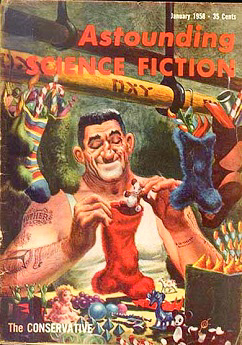
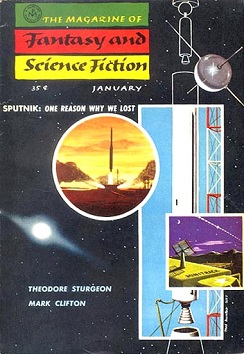
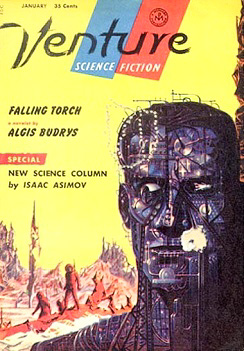
To view the entire list of weekly Old Time Radio episodes at Tangent Online, click here.